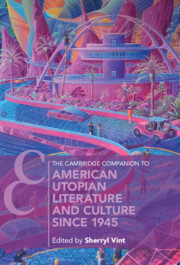Book contents
- The Cambridge Companion to American Utopian Literature and Culture since 1945
- The Cambridge Companion to American Utopian Literature and Culture since 1945
- Copyright page
- Contents
- Figures
- Contributors
- Introduction
- Chapter 1 Pandemics and the Lesson of History
- Chapter 2 American Futures
- Chapter 3 Engendering Utopia
- Chapter 4 America and/as White Supremacy
- Chapter 5 American Spirituality
- Chapter 6 Black Escapes and Black Wishlands
- Chapter 7 Latinx Belonging in New World Borders
- Chapter 8 Educating Desire
- Chapter 9 Utopia after American Hegemony
- Chapter 10 Technological Fantasies
- Chapter 11 Utopian Spaces
- Chapter 12 Environmentalism and Ecotopias
- Chapter 13 Economic Justice
- Chapter 14 Renewing Democracy
- Chapter 15 The Time of New Histories
- Works Cited
- Index
- Cambridge Companions To Literature
Chapter 7 - Latinx Belonging in New World Borders
Mestiz@ Rhetoric and Critical Utopian/Dystopian Dialectics of Ambivalence
Published online by Cambridge University Press: 09 May 2024
- The Cambridge Companion to American Utopian Literature and Culture since 1945
- The Cambridge Companion to American Utopian Literature and Culture since 1945
- Copyright page
- Contents
- Figures
- Contributors
- Introduction
- Chapter 1 Pandemics and the Lesson of History
- Chapter 2 American Futures
- Chapter 3 Engendering Utopia
- Chapter 4 America and/as White Supremacy
- Chapter 5 American Spirituality
- Chapter 6 Black Escapes and Black Wishlands
- Chapter 7 Latinx Belonging in New World Borders
- Chapter 8 Educating Desire
- Chapter 9 Utopia after American Hegemony
- Chapter 10 Technological Fantasies
- Chapter 11 Utopian Spaces
- Chapter 12 Environmentalism and Ecotopias
- Chapter 13 Economic Justice
- Chapter 14 Renewing Democracy
- Chapter 15 The Time of New Histories
- Works Cited
- Index
- Cambridge Companions To Literature
Summary
This chapter examines complex interplays of utopia/dystopia in the context of European colonization through two works: Alberto Yáñez’s postcolonial zombie narrative, “Burn the Ships,” and Yuri Herrera’s dystopian Signs Preceding the End of the World. These works grapple with biopolitical dialectics between utopia and dystopia, belonging and exclusion, and competing identities and epistemologies of mestizaje hybridity. Using as a starting point codices produced by mestiz@ scribes in the dystopian post-Conquest society of sixteenth-century New Spain, analysis draws from Damián Baca’s Mestiz@ rhetoric to demonstrate how these texts exemplify what he defines as a “powerful Mestiz@ rhetorical strategy” of nepantlism – “a strategy of thinking from a border space.” By self-reflexively engaging this Mestiz@ rhetoric through diegetic elements, these texts subvert hegemonic narratives of assimilation in the context of imperialism and the border.
Keywords
- Type
- Chapter
- Information
- Publisher: Cambridge University PressPrint publication year: 2024

